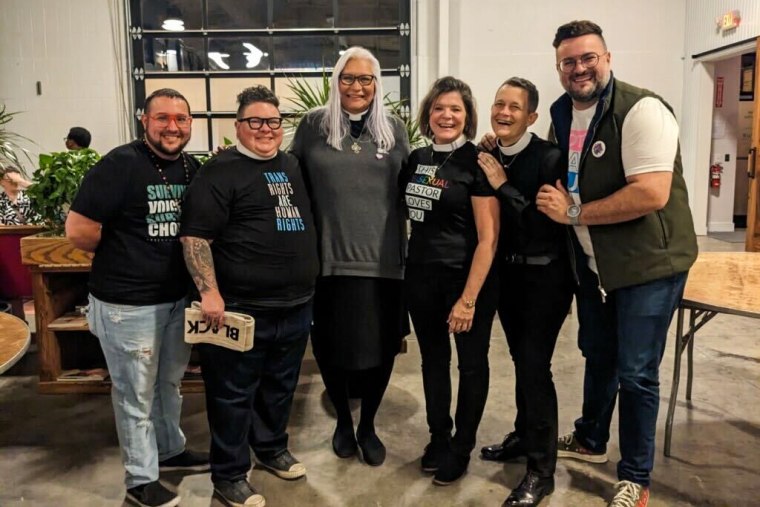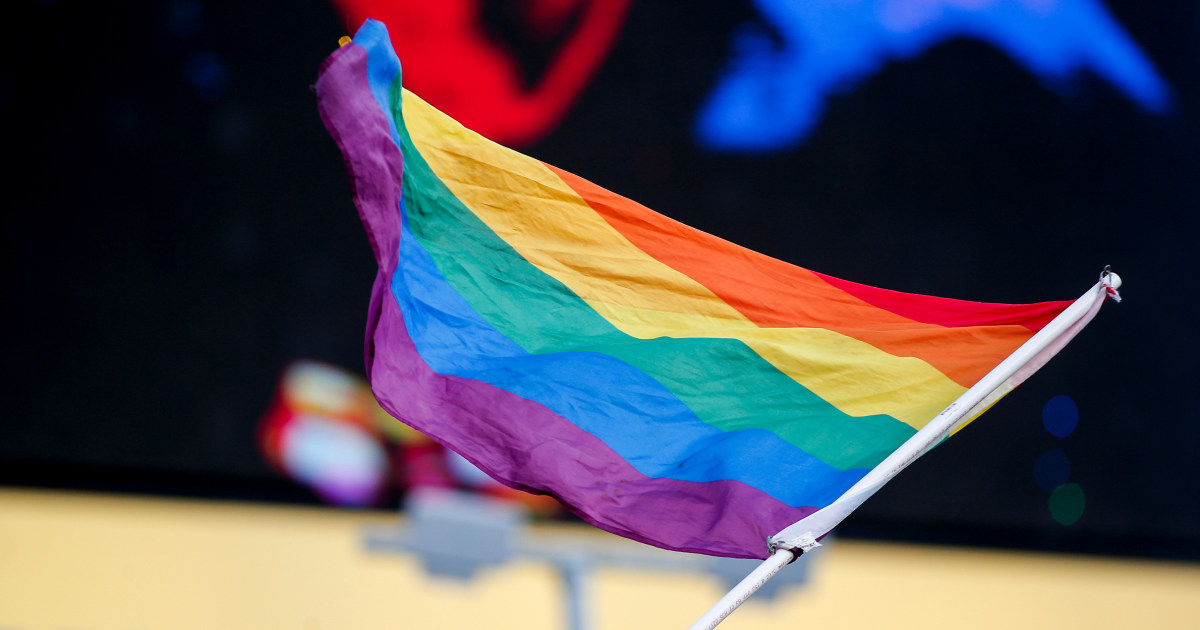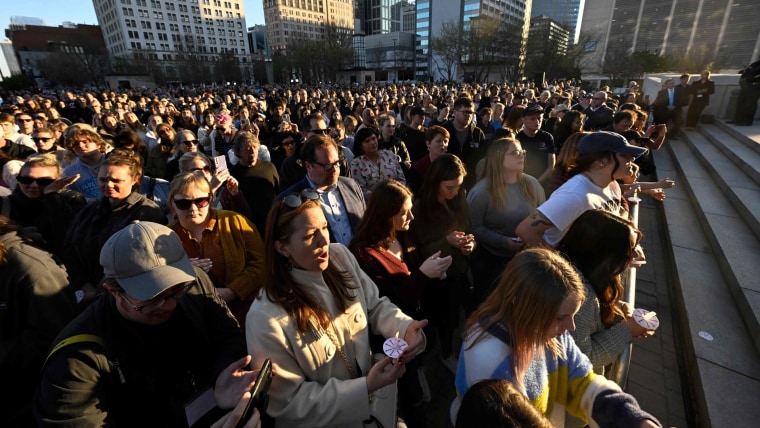NASHVILLE, Tenn. — Dozens of members of the LGBTQ community in Nashville came together Saturday for a private meeting to grieve and heal amid palpable and widespread fear since last week’s school shooting.
The location was closely guarded because of safety concerns for the participants, some of whom have been afraid to leave their homes and go out in public.
“This particular week has just been a nightmare. Everything from grief to anger to sadness,” the Rev. RJ Robles, a transgender community organizer who uses he/they pronouns, told the crowd. “This has also been part of the reason why we came together as a community to offer this healing space this evening.”
They had planned to spend Saturday rallying at a march against a new state law that was set to criminalize some drag performances. Then police identified the shooter in the attack at The Covenant School, where three children and three adults were killed, as transgender.
But there is still confusion and misinformation about how exactly Audrey Hale, 28, identified and whether Hale’s gender identity had anything to do with the motive behind the massacre.
Hours after he said Hale was transgender, Nashville Police Chief John Drake told NBC News’ Lester Holt that police “feel that” Hale “identifies as trans, but we’re still in the initial investigation into all of that and if it actually played a role into this incident.”
Drake did not say why police believe Hale was transgender. As of Thursday afternoon, six people who knew Hale had told NBC News that Hale did not directly come out to them as trans or talk about gender identity. It is not uncommon, however, for trans people to come out to only certain people in their lives — or not come out at all.
Since the shooting, advocates in the LGBTQ community said that there has been a flood of threats of violence and that people are afraid to leave their homes. Organizers postponed the march, and some advocates planned a smaller “evening of healing” for people to meet safely.
People gathered at small tables, putting arms around one another, and ate dinner together. At the meeting, which was not public but which an NBC News reporter was invited to attend, some people took comfort in music and poetry readings, some chose to sit in quiet contemplation, and others sat to discuss everything they had been feeling.
“Nashville collectively is grieving the loss of these six people, the three children and three adults,” said Robles, who was one of the LGBTQ clergy members who helped plan the event. “And then it’s also been difficult to feel like we somehow have to grieve behind closed doors.”
Robles said the angry and violent rhetoric that has escalated against the transgender and wider LGBTQ community since Monday has been “deeply, deeply worrisome for me.”
More on the Nashville shooting
People are “feeling devastated,” they said. “They’re also feeling a lot of despair and a lot of emotions are high. Folks are feeling emotionally exhausted. Folks are feeling physically exhausted.”
Roberto Che Espinoza, a transgender activist who helped organize the event and uses he/they pronouns, said they got many messages from members of the queer and trans community ahead of the march sharing threats of violence.
“I was afraid for my own life,” said Espinoza, who was supposed to be one of the speakers at the march.
“People are paralyzed in their fear,” they said. “We’re all suffering silently.”

After the march was postponed, Espinoza said the smaller event Saturday “is an opportunity to come together, to share a meal, to hear some music, to hear some poetry, to receive some encouragement.”
The march had been planned in response to a law that will criminalize some drag performances. The first-of-its-kind law will ban “adult cabaret entertainment” on public property or where it can be viewed by minors.
“Many folks in the Nashville community were really very disturbed about the drag ban, because this is people’s livelihood,” said the Rev. Dawn Bennett. “It was so that we could celebrate, we could come alongside our drag family in solidarity, show support.”
“Every element of my world right now is under attack,” Rebecca Seaver, who is a queer and non-binary drag performer in Tennessee, said.
Seaver — who goes by the stage name Mx Mona Von Holler and has been performing for 14 years — said that while the law targets drag and other performers, “at the end of the day, all of these things are attacking trans people, and gender queer people and LGBTQ people and that is the part that is the scariest.”
Seaver said that since Monday she has felt afraid and is “on guard all the time.”
She said that all of the focus on the gender identity of the shooter takes away from the broader issue of gun violence and mass shootings in America.
“Our children’s lives are at stake. They’re not in danger from drag queens or trans people. They’re in danger from guns,” Seaver said.
The law had been set to take effect Saturday, but a U.S. District Judge Thomas Parker in Tennessee temporarily halted it hours before it was set to take effect, cited constitutional protections of freedom of speech.
One of the bill’s Republican lead sponsors, Senate Majority Leader Jack Johnson, said when it passed that the measure “gives confidence to parents that they can take their kids to a public or private show and will not be blindsided by a sexualized performance.”
Under the law, a first offense is a misdemeanor and a second is a felony.
Bennett said that while there has always been discrimination against the LGBTQ community in the state, last week “it got crazier and crazier.”
Bennett said church members told her they “have been physically assaulted just because of who they are this week.”
“Hostility is pervasive right now. Right, panic and terror are pervasive right now,” she said.
Denise Sadler, who is transgender and has been performing as a drag queen for more than 20 years in Nashville, said fellow drag queens have told her “they were scared because they have received death threats” after the shooting.
Sadler co-runs a weekly drag brunch in the suburbs of Nashville. Ahead of her show on Saturday, friends told her to be careful and that they were worried about her.
She was determined to put on the show and performed to a sold-out crowd that had armed security at the venue.
Sadler said “people are always going to feed off of hate” and weaponize the shooter’s gender identity to feed anti-LGBTQ sentiment.
“I was not going to let people’s ignorance scare me out of my mission to open the eyes to the world that drag is not what people are trying to paint it out to be,” she said.



